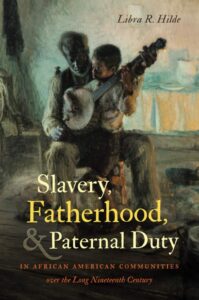Slavery, Fatherhood, and Paternal Duty In African American Communities over the Long Nineteenth Century – Libra R. Hilde
 Slavery, Fatherhood, and Paternal Duty in African American Communities over the Long Nineteenth Century. By Libra R. Hilde. (Chapel Hill: The University of North Carolina Press, 2020. pp. 400. Paper, $37.50.)
Slavery, Fatherhood, and Paternal Duty in African American Communities over the Long Nineteenth Century. By Libra R. Hilde. (Chapel Hill: The University of North Carolina Press, 2020. pp. 400. Paper, $37.50.)
In Libra R. Hilde’s masterful history of the role of enslaved and reconstruction era fathers, Hilde finds agency for men and how they related to and sustained their families. Contrary to popular conceptions, Hilde reveals that enslaved fathers took an active part in their children’s lives, even in aboard marriages. The way these fathers treated their children earned them deep respect, as informants to the WPA interviews in the 1930s revealed. No matter how little a role slave fathers played in their children’s lives, they took on a great importance emotionally for their children.
Hilde demonstrates that enslaved fathers participated in and provided for family in differing ways. Whether providing food for their families to supplement plantation diet, buying their families into freedom, enlisting in the military, or providing their children with an education, enslaved fathers provided for their kin and, though always reminded by whites of their lack of power, still managed to sustain families emotionally and physically. They endured the same hardships as mothers when enslavers sold their children away, and would work for years to attempt to buy their families’ freedom.
Hilde contrasts the dedication of the enslaved fathers to the neglect of white slavers for their children with the enslaved, often mixed race mulatto women rated as highly desirable for concubines. Many children of miscegenation lacked fatherly support, as enslavers often refused to recognize their children in a way that would have affirmed parental duties. These two chapters serve an important bolster to Hilde’s argument about the presence and importance of black fathers versus the callous and economical calculations of enslavers. While some whites acknowledged their children to a degree, many of them exploited enslaved women as concubines and then sold their children to reap a profit.
Enslaved fathers claimed as much agency as they could in a world perpetuating bondage and a lack of any and all rights. Hilde demonstrates not just their presence, but the importance of the actions they took in challenging the structures of slavery and discrimination, systems predicated on white men as gatekeepers to respectability and honor, a threshold they did not allow Blacks to cross, whether in bondage or in freedom. As we have seen in previous reviews, this balancing act centered around Edmund Morgan’s “American Paradox.”* Hilde writes:
Poor whites were willing to forego potential class solidarity and the opportunity to make economic gains in favor of a rigid racial hierarchy. The elite accorded working-class men and women access to “whiteness” in return for their needed assistance in keeping African Americans subjugated. (284-285)
In this way, poor whites concluded with the slave-owning class to perpetuate a system of bondage based on race and driven by economic dictates. Even within this system, black men found ways to uplift their families and fight against dominant narratives describing them as absent or neglectful, even dysfunctional. They put their families above all else.
But even though the majority of Black men in Hilde’s book cared for their families, some exercised agency in different ways. Men who escaped slavery by running away had conflicted feelings about leaving their families. Trying to escape with a family was difficult. Children lacked the stamina to keep up the necessary pace, large groups moved more slowly and were more visible. Some men, unwilling to surrender their agency and unable to protect their loved ones from the brutality of slavery, ran away as a way to protest against the conditions of their enslavement in a family context. They could no longer stand by and watch enslavers abuse their families. They felt emasculated and dishonored, and so they ran so they would no longer have to face the humiliation of being unable to protect their families from abuse.
Paternal agency was important for men and women. Hilde reinserts enslaved fathers back into the narrative of family under slavery and reconstruction. Even when not physically present, enslaved fathers left deep impressions on this children. Children born of miscegenation suffered from a lack of paternal care, as their fathers often refused to acknowledge them or, at the end of the day, viewed them as financial assets. Either way, enslaved fathers played an important role in their families’ lives, and Hilde demonstrates this by arguing against a traditional narrative of absence that continues to this day. In this way, Hilde gives enslaved fathers agency that they have long been denied.
Most of the books I read during my time as a graduate student regarding slavery and gender were on women. The history of enslaved women is crucial to our understanding of the gendered and lived enslaved experience. Even Hilde’s book details a history of enslaved women’s experiences, especially in the chapters about how female enslaved women related to their masters and sexual abusers. But Hilde’s book is important precisely because she understands the complicated relationships paternal duty interjected into slave families. This book is crucial to understanding a more complete picture of how slave families worked, especially through the life of enslaved male’s role in family and slavery. It is a new take on an important subject. I would recommend it for undergraduate or graduate classes on slavery, as it paints a more complete picture of the abhorrent institution of slavery and how it warped even the most intimate of relationships.
*Morgan, Edmund S. “Slavery and Freedom: The American Paradox.” The Journal of American History 59, no. 1 (1972): 5–29. https://doi.org/10.2307/1888384.
